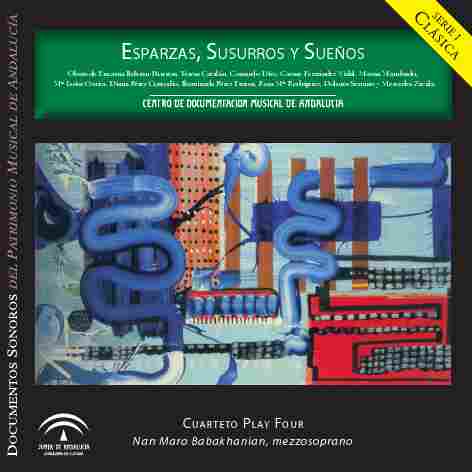Esparzas, Susurros y Sueños
Detail DS-0155 You can buy this record here 11 € Esparzas, Susurros y Sueños Cuarteto Play Four
Teresa Catalán Esparzas (2010) 1-I-Yo callé males sufriendo 2-II-Qué amador tan desdichado 3-III-Callé con mucho temor 4-IV-Es mi pena desear
Carme Fernández Vidal 5-Nada (2010)
Mercedes Zavala Poemas Andalusís (1995) 6-I-Lluvia sobre el rio.
Consuelo Díez 7-Niña Valiente
Iluminada Pérez Frutos 8-Aleph (2010)
Rosa Mª Rodriguez Hernández 9-Oye: Yo era como un mar dormido
Dolores Serrano Cueto 10-Nudos (2009-10)
Encarnación Beltrán-Huertas López Susurros de Alcoba 11-I-Sentirte 12-II-Arrullo 13-III-Sueño de tí
Marisa Manchado Torres 14-Retazos
Diana Pérez Custodio 15-Ostinato Rap (2010)
Maria Luisa Ozaita Suite Lorquiana 16-I-La media luna 17-II-Nana 18-III-¡Ay qué trabajo…!
|
About The group “Play Four” started in 2010 with the opportunity to perform music composed for them by several women composers who attended the Cadiz Festival of Spanish Music. Their amazing skill made it possible for them to consolidate their position as a stable ensemble capable of performing any piece of music from the Standard Classical, Contemporary Classical and of course, Spanish repertories either written for this group or pre-existing. History has often ignored women. In the field of music, they are recognized as performers, teachers and it is women who impart folk and oral traditions, but in music composition, their role is largely secondary. Fortunately, this situation has been changing since the second half of the 20th c. and into the 21st c. Starting with Kassia—the first woman composer in Byzantium whose extant works date from the 9th c., women have made lasting contributions. Some of their names only appear in written documents while others have extant musical works. Besides recovering this older musical heritage, we must add the re-evaluation and visualization of contemporary works written today. The “Workshop for Women Composers” started as an initiative of the Andalusian Council for Cultural Affairs (Consejería de Cultura) in the Andalusian Institute for Women (Instituto Andaluz de la Mujer), and developed within the context of the Cádiz Festival of Spanish Music (Festival de música española de Cádiz) which is held periodically and in collaboration with the University of Cadiz and the Center for Musical Documentation (Centro de Documentación Musical de Andalucía). Ever since the first Festival in 2005, it has become meeting place, a forum for reflection and creation for women composers. There are seminaries, informal gatherings, discussions and publications which deal with the aesthetic ideas of these women, scores and printed music, commissions and recordings. The Ladies’ Castle (Castillo de Damas) emerged from this Workshop. The idea first started in the I Meeting: “Women and musical creation” which was held iat the III Cadiz Festival of Spanish Music 2005. At the second Festival the composers were asked to write a piece for solo organ or organ and voice. The third Project was music for flute and marimba (or percussion instruments), and the fourth one proposed works for mezzo- soprano and trio which were premiered at the Festival in 2010. It is this program you will hear on this recording. Nan-Maro Babakhanian has been associated with the “Workshop for women composers” in Cádiz ever since it began. Nan-Maro is at the heart of the PLAY FOUR Quartet. This mezzo-soprano is a researcher and a cultural administrator, and along with her vocal abilities we must certainly mention her work on an international level as an advocate and educator of “Spanish Song”. The PLAY FOUR Quartet’s is primarily concerned with promoting and disseminating little known music and/or composers. The repertory on this recording is a pot-pourri of perceptions and insights, different ways of saying things, and in which humor, lyricism and dramtic gestures are certainly present, as well as the search for new musical languages and resources. A real challenge through its variety, breadth and complexity that Babakhanian and the other members of the PLAY FOUR Quartet communicate with such undesrtanding and skill. Reynaldo Fernández Manzano Director of the Centro de Documentación Musical de Andalucía and the Festival de música española de Cádiz
|

